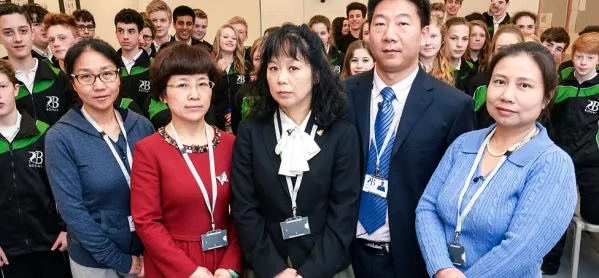Any system that forces children to study for 12 hours a day is going to produce high test scores, a leading Chinese professor of education has said, following the news that the pupils educated in the BBC’s Chinese School experiment outperformed their conventionally educated peers.
“Results are determined by your learning behaviour,” said Lianghuo Fan, former teacher and teacher-trainer in China and professor of education at the University of Southampton. “And they were learning for 12 hours.”
In the three-part BBC2 documentary series, Are Our Kids Tough Enough? Chinese School, 50 Year 9 pupils at Bohunt School in Hampshire - TES school of the year, 2014 - were taught for four weeks as though they were at school in China. Lessons began at 7am and finished at 7pm, and included copious front-of-class dictation and rote-based learning.
The English 14-year-olds did not respond to this well. By episode two, those who did not spend the lessons singing or drinking cups of tea were simply ignoring their teachers altogether.
But in episode three, screened tonight, the 50 Chinese-school pupils were pitted against the rest of their year in science and maths tests. And, despite the quiet confidence of Bohunt’s head and the shame-filled agonising of the Chinese teachers, the Chinese-school pupils won out.
In maths, the Chinese-school pupils scored an average of 67.7 per cent, compared with the average of 54.8 per cent scored by the rest of Year 9. In science, the Chinese-school average was 58.3 per cent, compared with 50 per cent for the rest of the year.
Professor Fan was unsurprised by this. “The expectation of Chinese students’ commitment is higher,” he said. “They are expected to do more homework, to review their studies.”
But, he adds, the two systems have more in common than the documentary suggested. For example, he said, the English curriculum involves an element of rote-learning, too. English pupils are expected to memorise their times tables up to 12. Chinese pupils, meanwhile, stop at the nine times table.
“I hope people haven’t got the impression that Chinese students are only asked to memorise,” he said. “Critical thinking and creative thinking are all emphasised in the Chinese curriculum.
“You need to have a little balance. In China, the academic structure is too tight. Teachers ask students to spend too much time on academic subjects, to review, to do homework. In the British system, children have more freedom. But I think they can learn from each other.”




